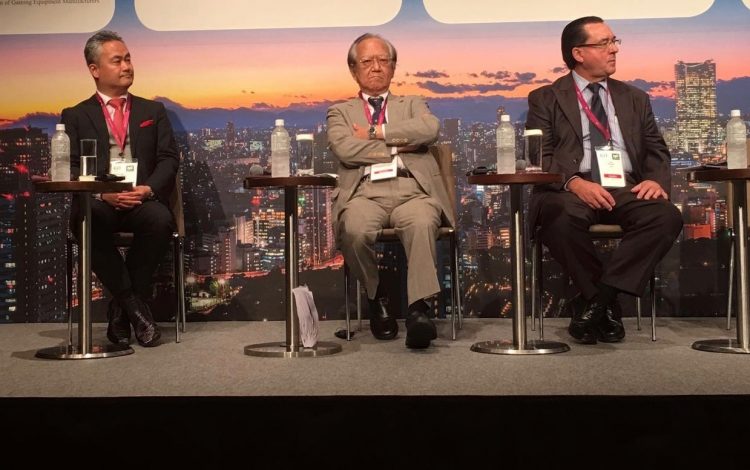An expert in Japanese government policy has described the Integrated Resorts Promotion Bill passed last December as “poorly crafted” and a genuine threat to the long-term health of the nation’s burgeoning casino industry.
Mr Hidetaka Saeki (seated center), Honorary Fellow, School of Government at Kyoto University & President of IRIS Research Institute, claims that rather than pave the way for Japanese IRs, the Bill will in fact hinder them due to its contradictory nature and failure to address widespread opposition from the general public.
“This law states that the purpose of the law is to foster local economies or promote tourism in local areas, but the definition of integrated resort contradicts that because they have to be so big,” Mr Saeki told Inside Asian Gaming.
“If you look at somewhere like Wakayama Prefecture where the population and the economy is quite small, to maintain a huge facility like that is very difficult. They talk of conventions and amusement parks but even the Tokyo Disney resort is facing some difficulties which shows how difficult it is to maintain the amusement park to be profitable.
“MGM used to have a huge amusement park and they had to shut it down because it just doesn’t make money. The same thing can happen unless you locate this IR in the densely-populated areas such as Yokohama and Tokyo.
“These are the only areas where the so-called IRs can survive.
“So, contrary to the purpose of this law to foster local economies with IRs, the basic IR model doesn’t fit that. It can only go somewhere that already has a big population.”
The problem, according to Mr Saeki, is a result of Japan’s ruling Liberal Democratic Party pushing the Integrated Resorts Promotion Bill through the Diet without consulting the nation’s elite Bureaucracy first.
The Bureaucracy has long played a vital role in planning and implementing the nation’s laws due to its disconnect from political in-fighting and reputation for applying a more reasoned approach.
“Japan’s politicians have very close ties with the Bureaucracy and it will actually prepare laws for the politicians, but in this case there was no direct or indirect involvement of the Japanese Bureaucracy,” Mr Saeki said. “The brains for this drafting were business consultants paid for by the IRs.”
Mr Saeki also noted that more than 80% of the general population in Japan remain opposed to IRs, leaving promoters to “sugar coat” the term “casino” to try and make the prospect more palatable.
But he warned it was those tasked with drafting the upcoming IR Implementation Bill – due to be put forward in December 2017 – that would find the previous Bill most challenging.
“The coming law will be prepared and drafted by the Japanese Bureaucracy so that will be, I hope, a better law than the Integrated Resort Promotion law,” Mr Saeki said. “But I want to explain the difficulty my junior colleagues are facing because the poorness of the basic law has a great influence and has created difficulty for the next law to fit.
“How is it possible for Wakayama Prefecture to have a sustainable, profitable IR in the long run?”




































